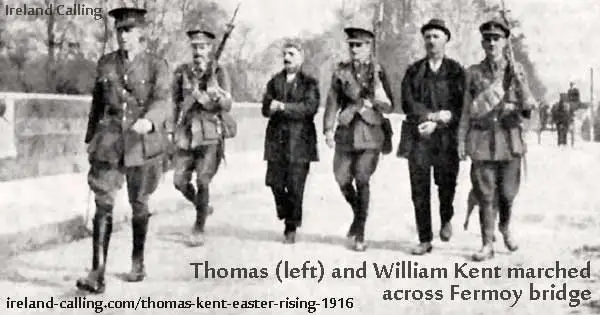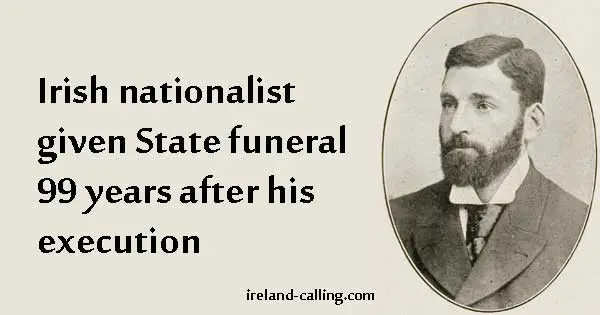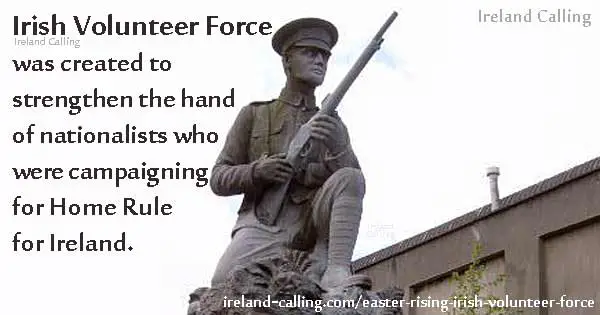Thomas Kent didn’t take part in the fighting during the 1916 Easter Rising but was still executed because he had intended to take part and because of a gunfight at his home in which a police officer was killed. He was belatedly granted a state funeral in 2015 with Taoiseach Enda Kenny delivering the funeral oration.
Kent was part of a nationalist family from Castlelyons in Co Cork. They had a long history of opposing British authority and were particularly active during the Land War in the 19th century.
Thomas and his three brothers had been in and out of jail for years due to their continuing support for nationalist causes and agitation against British rule. They became a thorn in the side of the police, the Royal Irish Constabulary, who regularly raided their home in search of arms and incriminating evidence.
Thomas was very religious and a supporter of the temperance movement. He was a member of the Gaelic League and joined the Irish Volunteers as soon as they were formed in 1913. In 1914, the Kent brothers interrupted a speech given by the leader of the Irish Parliamentary Party, John Redmond, at Dungourney in Cork.
Family opposed Redmond and enlistment to British Army
They disliked Redmond because he advocated Home Rule for Ireland rather than the full independence that they wanted. They were also outraged that Redmond was urging Irishmen to enlist in the British Army following the outbreak of the First World War.
They hijacked Redmond’s meeting by getting members of the Gaelic Athletic Association to stage a parade and by inviting Terence MacSwiney to give an anti-recruitment speech. The police redoubled their efforts to stop the brothers and their disruptive activities. They eventually succeeded when they raided the family home and found arms and ammunition.
Thomas was jailed for two months but it didn’t deter him; he and his brothers remained committed to the nationalist cause and were preparing to take part in the Rising when they received the order from the leader of the Irish Volunteers, Eoin MacNeill, saying that it had been cancelled.
They obeyed the order and stayed at home, confident that the action would resume at some time in the near future. Unknown to them, Patrick Pearse and the other six leaders of the Rising decided to go ahead despite MacNeill’s order.
It meant the Rising wasn’t as fully supported as intended and was almost exclusively confined to Dublin. (There was also an isolated outbreak in Co Wexford).
Once the Rising went ahead, nationalist sympathisers like the Kent family immediately came under suspicion, even though they weren’t directly involved at the time. Their home, Bawnard House, was raided by the police.
Kent and his brothers in gunfight with police
Thomas Kent and his three brothers, Richard, David and William refused to yield and a gunfight ensued, lasting four hours. Head Constable William Rowe of the Royal Irish Constabulary was killed in the fighting.
The family were outnumbered and eventually had to surrender. Richard tried to escape at the last minute and was shot dead. David had been seriously wounded earlier.
After Thomas was arrested, the police tried to humiliate him by parading him through the town of Fermoy. His hands were tied and he walked barefoot as they wouldn’t allow him to wear his boots.

Thomas, William and David were all charged with armed rebellion and tried by court martial. William was acquitted but Thomas was found guilty and sentenced to death.
Passing sentence, the judge said: “You stand before me guilty of the most heinous of crimes against the British Crown. You are guilty of treason. In my view, when a head constable has been murdered, when your brother lost his life, I am left with no option but to sentence you to death by firing squad. You will be taken to Cork Army Barracks where on the ninth of this month you will be shot until you are dead. May God have mercy on your soul. Take him down!”
Thomas Kent was executed by firing squad at Cork Jail on 9 May 1916 and was buried in the prison grounds.
Finally granted a state funeral in 2015
David Kent was also found guilty and sentenced to death but the sentence was later commuted. He was sentenced to five years in prison instead. The reason for the unexpected leniency may have been due to the shift in public opinion towards the Rising and the rebels. David’s wounds from the gunfight meant he was dealt with later than Thomas. By then, people in Ireland and the rest of the world were becoming appalled at the daily executions.
The British feared they may be doing more harm than good and decided to call a halt. Éamonn de Valera and the Countess Markievicz may also have benefited from this shift in public opinion as they also had their sentences commuted.
Only two rebels were executed for their activities outside of Dublin during the Easter Rising. One was Kent and the other was Sir Roger Casement, who was hanged in Pentonville Prison for his part in the attempt to smuggle arms to Ireland from Germany.

Thomas Kent was belatedly granted a state funeral on 18 September, 2015. His body was exhumed from the prison grounds. He lay in state at Collins Barracks in Cork and he was buried at St Nicholas’ Church at Castlelyons. President Michael D Higgins attended the funeral and Taoiseach Enda Kenny delivered the graveside oration.
In 1966, Cork Railway Station was renamed Cork, Kent Railway Station in honour of Thomas Kent.
easter-rising.html
